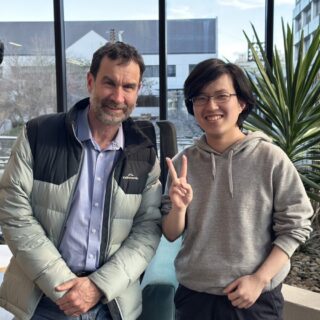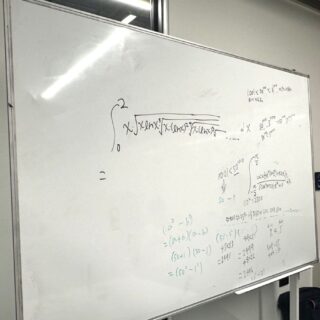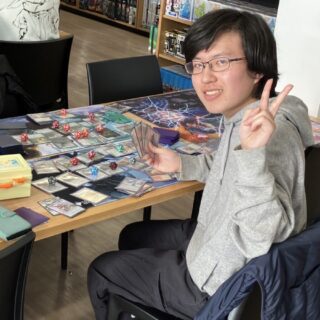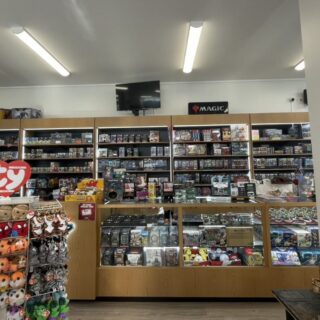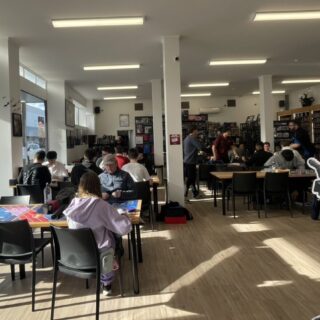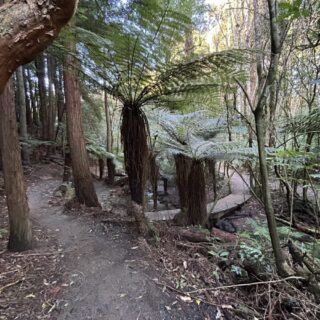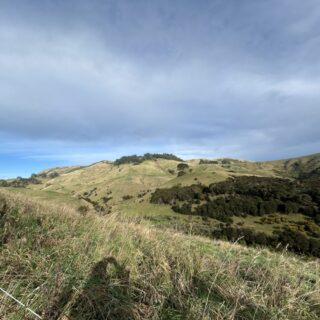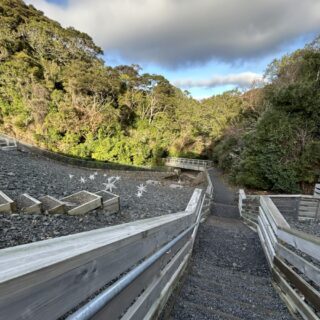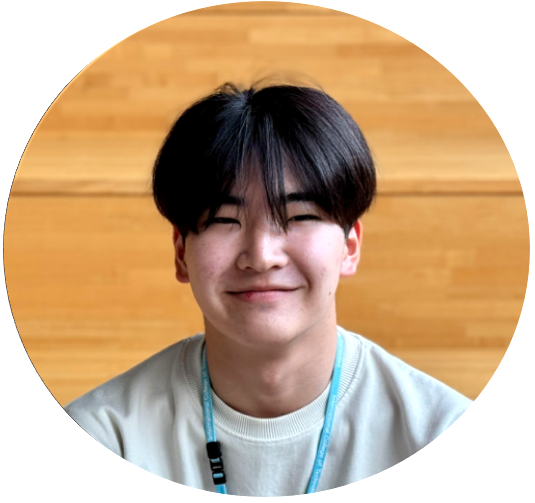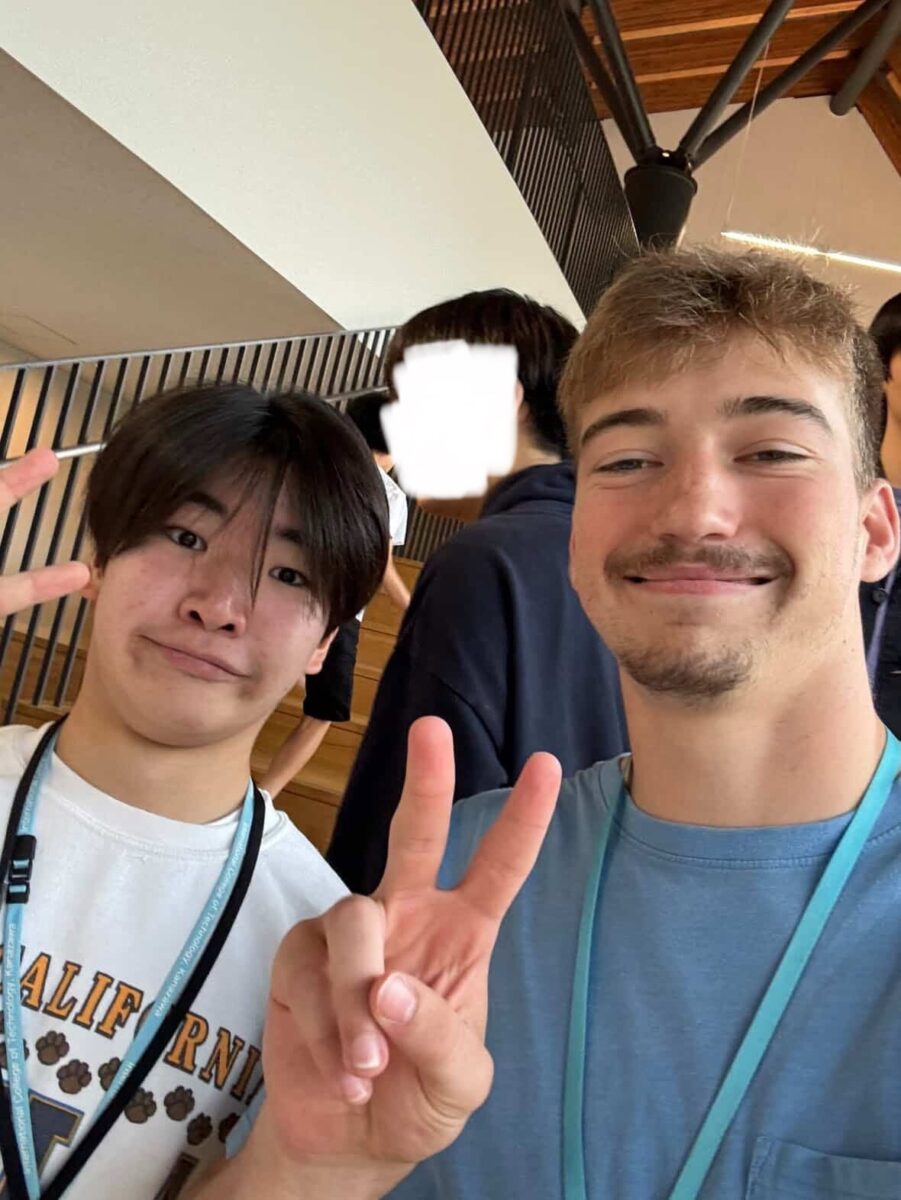 About 350 years ago, on July 13th, the famous poet Matsuo Basho wrote the haiku:
About 350 years ago, on July 13th, the famous poet Matsuo Basho wrote the haiku:
“How still it is here—
Stinging into the stones,
The locusts' trill.”
But according to the news this year, because of global warming, people in many places said that cicadas did not sing even after July began. Now, one month later, Japan is still in the grip of a very hot summer, I believe. How are you all doing? From the other side of the Earth, I am Rintaro Kamoshita, a 3rd year student at International College of Technology, Kanazawa.
Our life in New Zealand is very different—almost the exact opposite—from the summer in Japan. Every day we burn firewood in the fireplace to fight the cold. Today, I would like to tell you about my “unusual daily life” here in New Zealand, especially as the person who is sometimes called the “subculture manager” of our school.
First, I know you may not be the same, but for me, a day usually begins with solving a math problem, and ends with solving another math problem. When I was in Japan, at ICT, I did not have much time for such study, because I was busy with Robot Contest preparation and with many assignments. Only on holidays could I do math freely. However, after coming to New Zealand, my life changed a lot. Simply put, I gained “more than 24 hours of free time in one day.” Because of this, I could make a new style: at night, I study math for two or three hours and choose one problem, and then I try solving that problem the next morning. Thanks to this, I now have a lot more time to think about math in my daily life here.
On holidays, I often go to Otago Polytechnic. There, I write a math problem and its process of solution on a whiteboard, and leave it there before going home. It was like creating a secret code that only those who love math could understand—much like the one in Sir Arthur Conan Doyle’s The Dancing Men. Recently, one math teacher saw my problem and we were able to talk about it. Some people say that “math is a language.” I felt that it was really true, because at that moment, we crossed the boundary of ordinary communication by using the language of math.
-
Sharing a great moment with Mark Harmer, the inspiring math lecturer at Otago Polytechnic — we really hit it off!意気投合した、オタゴポリテクニクの数学担当教員、Mark Harmer先生と共に
-
A holiday spent with classmates, playing with an unsolvable expression — all that remains is a trace of our battle, like a dream. とある休日にて、クラスメイトと、解けない数式で遊んだ、”兵どもが、夢の跡”
But since I am supposed to talk about subculture, I should now speak about my “card game life” in Dunedin. First, let me tell you something surprising: in New Zealand, there are no shops that sell single cards. You may think “so what?” but for card gamers, this is almost like a death sentence. What is worse, in Dunedin, there is only one card shop in the whole city. Because of this, I had to spend three months without playing card games. This was maybe the first time since I was five years old.
However, in mid-July, something changed. One Saturday, I went skating with my friends at the southern ice rink. On the way back, I found a card shop, because I saw a sign with a very famous Japanese character. I went inside and looked at the card products. Then the shop owner talked to me, and told me that every Sunday they have a tournament. The next day, I joined the tournament with my friend, and I had my first international card game exchange.
There, I found something surprising. In general, New Zealand people are very free, and their way of thinking is different from Japanese people. But in the card game community, everything was almost exactly the same as in Japan. For example, if someone used a very strong deck, other players did not like it. And if someone was very unlucky and already almost losing, other players tried not to attack too hard. On the internet, I often saw people saying “foreign players act just like Japanese ones.” I found out that this was true.
-
A refreshing smile after a joyful day with friends and new local faces.友人と共に、初対面の現地人と遊びまくった日の清々しい笑顔
-
At the counter of a card shop. カードショップのカウンター
-
A packed play area full of energy.活気づく店内
Now, I want to finish my journal with a message to the students in the Hakusanroku Campus, and also to junior high school students who are thinking of entering our school. What I want to say is this: English ability is not the most important thing. …Okay, maybe I exaggerated. What I really mean is: communication ability matters much more.
I don’t play popular games, or popular sports. Also, I do not enjoy speaking with young people very much. In other words, I have some serious handicaps. But even so, I can still “fight,” thanks to two things I learned in Japan: the skill of talking with teachers, and the skill of talking through card games. These two skills have a special power: they automatically create a moment when the other person listens to me. So I recommend that you also make a strategy about how to communicate in English before you come to New Zealand.
For example, I live in a homestay with a Japanese family, so in daily life I do not use much English. But still, compared with other students, the amount of English I touch is not any less. That is, I can say I won by strategy. Dunedin is truly a wonderful place. So I hope you can make it not a place of suffering and homesickness, but a place of your own growth.
P.S. Actually, I am from Shinshu, so I wanted to start with Kobayashi Issa, not with Matsuo Basho.
Rintaro Kamoshita
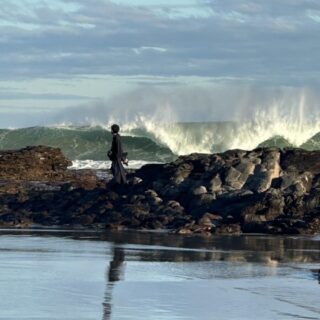
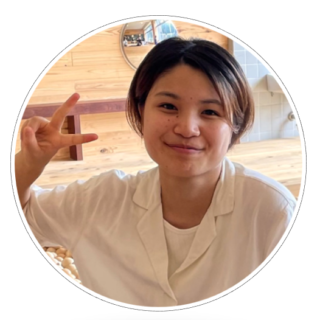 Hello, I’m Ruuna Nakazawa, a 3rd year student at ICT. Right now, it's the middle of winter in New Zealand, and it’s as cold as in January in Japan. Because of that, warm outerwear like a down jacket is essential when going outside. Today, I’d like to share a bit about my daily life here in New Zealand.
Hello, I’m Ruuna Nakazawa, a 3rd year student at ICT. Right now, it's the middle of winter in New Zealand, and it’s as cold as in January in Japan. Because of that, warm outerwear like a down jacket is essential when going outside. Today, I’d like to share a bit about my daily life here in New Zealand.
I’m staying with a host family that includes a host mother, a host father, and two host sisters who are around my age. When I first arrived, there were also two other housemates, but one of them recently returned to her home country. I had a lot in common with her, and even though we only spent a short time together, we became very close. I don’t talk with my host family extensively every day, but they all have a great sense of humor, and simply spending time together in the living room often brings lots of laughter. There's also a large dog at home, and I often play with it.
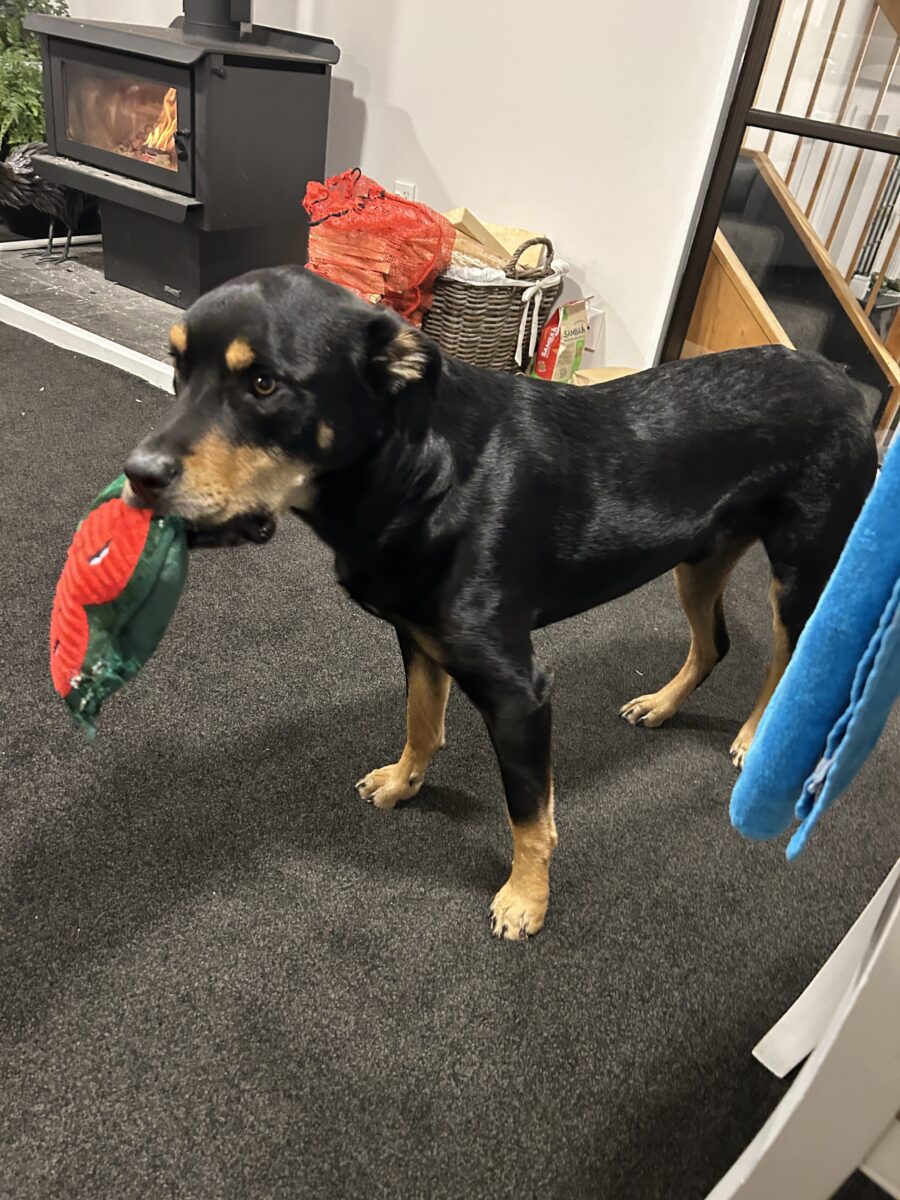
My host family‘s dogMy host family‘s dog
The house is located on a hill, and from the living room I can enjoy a wide view that includes the sea. One night, when the aurora appeared, I was able to watch the beautiful display right from the balcony. The house also has an electric piano and a garage with a dance floor, creating the perfect environment for me to fully enjoy my hobbies—playing the piano and dancing.

The aurora seen from the balconyThe aurora seen from the balcony
I have fewer classes here than I did during my 1st and 2nd years, and there are more holidays as well, so I now have more free time. Thanks to that, I’ve been able to spend plenty of time on my hobbies like piano, dance, and drawing. Speaking of dance, I’ve joined a dance club at Otago Polytechnic and take weekly lessons to improve my skills. I’m also taking an online course about AI, using my free time to deepen my interests.
One unique feature of New Zealand is its rich natural environment, and I’ve been going on hikes regularly to experience it. Dunedin has many well-maintained walking tracks managed by the local government, and I choose where to go by checking the city’s website. Each location offers different scenery and plants that I wouldn’t find in Japan, which makes each hike fascinating. As a dog lover, I also enjoy encountering dogs out on their walks.
While I’ve been enjoying these peaceful and fulfilling days, I also face some challenges. One of them is my English ability, especially speaking. Although I’ve gotten used to being surrounded by English, I still lack the confidence to actively start conversations on my own.
Now that a third of my study abroad experience has passed, I want to continue making the most of this warm host family environment and the free time I have, taking on new challenges little by little, and continuing to grow as a person.
Ruuna Nakazawa


Hello, this is Hayato Ogawa (Associate Professor) at International College of Technology. I teach Engineering Design 2 and Computer Skills 2 classes at Hakusanroku campus. As someone who enjoys watching science fiction movies about AI and the future—like 2001: A Space Odyssey—I’m always fascinated by how technology is imagined and sometimes feared. Instead of fearing AI, I believe it's important to understand how it works and how we can control it responsibly.
Several years have passed since the introduction of the JetBot project in the Computer Skills 2 class, and this hands-on activity remains an integral part of the curriculum at ICT. Despite the passage of time and the occasional loss of a few JetBots due to hardware failures or accidental falls during operation, the project continues to provide students with a valuable introduction and experience in both robotics and artificial intelligence.
Learning Through Doing: From Python to Collision Avoidance
The JetBot platform, built on the NVIDIA Jetson Nano microcomputer, offers students a practical introduction to AI-based robotics. Students begin by learning basic Python programming to control their robots, followed by creating datasets through image collection, and ultimately developing collision avoidance models. By using the onboard camera, each student trains their JetBot to navigate safely through obstacle courses, applying both theoretical knowledge and practical skills to understand how the quality of their dataset and models affects operation.
Over the years, this activity has not only strengthened students’ understanding of AI and robotics. It has also emphasized the importance of high-quality data, careful problem-solving, and system reliability, cultivating essential skills for future careers in engineering and technology. As I noted when the program was first introduced, AI technology is becoming mainstream; some students may eventually work in fields such as autonomous vehicles, where accuracy and data integrity have direct real-world implications.
Overcoming Challenges and Fostering Growth
One ongoing challenge remains the English proficiency required to navigate the official JetBot documentation and programming materials, which are written at a university level. However, with the consistent support and guidance of faculty members and learning mentors, students can overcome these language barriers while developing both technical and academic skills in the process.
While a few JetBots have been repaired along the way, each incident has provided additional learning opportunities, reinforcing the realities of working with physical hardware. The JetBot project continues to serve as a meaningful, multidisciplinary learning experience that combines programming, artificial intelligence, and practical troubleshooting. It remains a strong example of ICT’s commitment to preparing students for the demands of the modern technological landscape.
Hayato Ogawa
Hi, my name is Kotaro Higuchi, a 1st year student at the ICT. Recently, five high school students from the state of Missouri, USA, visited our campus. Today, I would like to share my memories with my buddy, Isaac.
I first met Isaac on the evening of Saturday, June 7th, 2025, the day they arrived at the Hakusanroku campus. My first impression of him was that he was tall and had such an adult aura, so I couldn’t believe that he is a high school student. However, when I tried to speak with him, I found out that he was interested in Japanese culture. While we were explaining our school, he listened aggressively and frequently asked questions.
I was relieved that we were able to become friends so quickly. The next day, we went on a trip to Kanazawa. During the bus ride, Isaac was curious about everything he saw in Japan. He said the rice plants growing in the paddy fields were beautiful and we had an exciting conversation about the differences between school life in Japan and America. In Kanazawa, he was impressed by the clever design of Kanazawa Castle and saying, “This castle must have been really hard to attack.” I thought that was a very interesting and unique observation. At the end of the trip, he became hooked on Japanese food, and he ate Dango and bought lots of Onigiri and snacks at 7-Eleven.
After that, we spent our weekdays together attending some classes. We also played basketball and American football after school, which made the rest of the time we shared really satisfying. I hope we can meet again someday.
Kotaro Higuchi
 Hello, this is Yuri Makada from the Hakusanroku Office. This time, I would like to introduce a project created by 1st year student Taiki Sasaki using Autodesk Fusion.
Hello, this is Yuri Makada from the Hakusanroku Office. This time, I would like to introduce a project created by 1st year student Taiki Sasaki using Autodesk Fusion.
In the Computer Skills IA course for 1st year students, students begin working with Autodesk Fusion to create 3D models right after entering ICT. In this class, students learn the fundamental computer skills necessary for engineers. Taiki Sasaki, a 1st year student, applied what he learned in class and spent two months creating a 3D model of a V8 engine! I've put together a video showcasing his work—please watch!
Yuri Makada









